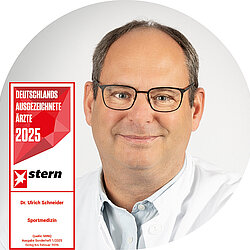WIR IM SPORT 02.2024
Magazine of the Landessportbund NRW
PDF-Download
A morning walk, a jog in the park or a bike ride with friends - it is undisputed that physical activity is an essential part of promoting health. But why is this the case? Two "magic words" are at the forefront here: myokines and telomeres.
A central mechanism of health promotion lies in the musculature, which is not only part of the musculoskeletal system, but must also be considered as an endocrine organ (hormone-producing)
. During exercise, messenger substances known as myokines are released from the muscles, which lead to positive effects in various organ systems. They were only discovered in the early 2000s. Different forms of training, such as strength training or moderate or intensive endurance training, lead to a different
release of myokines.
Endurance training as "anti-ageing medicine"
Another approach to understanding the positive effects of physical activity lies in the area of telomeres. These lie like protective caps at the ends of our chromosomes and protect our genetic material. Every time a cell divides, the telomeres shorten. If they are so short that they can no longer protect the chromosomes, the cell dies. This mechanism is therefore closely linked to ageing processes in the body. In a study with 125 participants, it was found that regular endurance training (3 times 45 minutes per week) prevented the shortening of telomeres, thereby maintaining the protective effect on the chromosomes. Regular endurance training therefore acted as an "anti-ageing medicine".
In recent years, research and studies - also using the example of myokines and telomeres - have contributed a great deal to our understanding of regular exercise. So there are many good reasons to stay active. Regular exercise not only helps to prevent numerous diseases such as cardiovascular diseases, diabetes mellitus, cancer and psychiatric illnesses, but can also be used as a therapeutic component for chronic diseases. Exercise and sport can therefore be seen as a medicine without any significant side effects and can effectively contribute to prolonging life.



